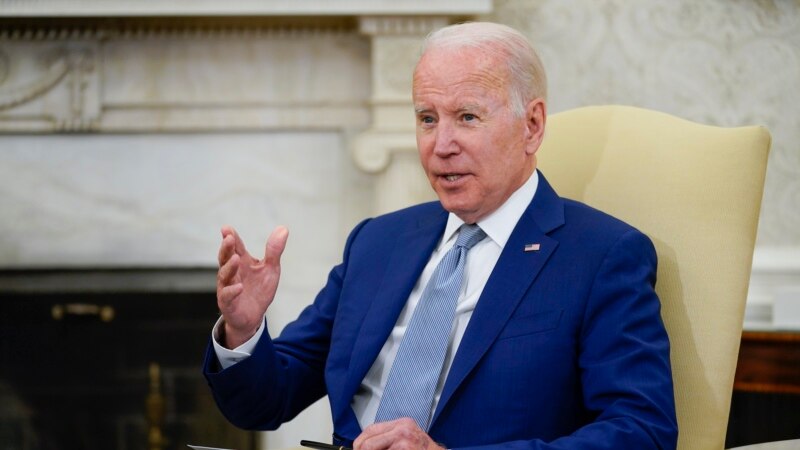
U.S. President Joe Biden said Tuesday he decided to provide Ukraine with “more advanced rocket systems and munitions” as part of U.S. efforts to help the Ukrainian fight against a Russian invasion now in its fourth month.
Biden wrote in an opinion piece in The New York Times that the United States has aided Ukraine with weapons and ammunition in order to bolster its position on the battlefield and ultimately in peace negotiations with Russia.
“Unprovoked aggression, the bombing of maternity hospitals and centers of culture, and the forced displacement of millions of people makes the war in Ukraine a profound moral issue,” Biden said.
The decision to send more advanced weapons follows earlier reluctance on the part of the Biden administration. Biden himself said Monday that the United States would not send rockets “that can strike into Russia.”
The Associated Press cited senior administration officials as saying the new weapons package, set to be detailed Wednesday, includes medium-range rockets that can travel about 70 kilometers. The officials also said Ukraine had given assurances its forces would not fire rockets into Russian territory.
Biden wrote Tuesday that he does not seek war with Russia.
“As much as I disagree with Mr. Putin, and find his actions an outrage, the United States will not try to bring about his ouster in Moscow,” Biden said. “So long as the United States or our allies are not attacked, we will not be directly engaged in this conflict, either by sending American troops to fight in Ukraine or by attacking Russian forces. We are not encouraging or enabling Ukraine to strike beyond its borders.”
Russia has taken control of half or more of the eastern Ukrainian city of Sievierodonetsk that plays a pivotal role in Moscow’s attempt to capture the industrial Donbas region, the city’s mayor and a Ukrainian regional governor acknowledged Tuesday.
Luhansk’s regional governor, Serhiy Gaidai, said that after days of fierce fighting between Russian and Ukrainian troops, Moscow’s forces control most of the city but have not surrounded it.
He said in an online post that intense Russian shelling had made it impossible to deliver humanitarian supplies or evacuate the 13,000 people still sheltering in the devastated city that once had a population of 100,000.
Mayor Oleksandr Striuk told The Associated Press Russian forces, in a “frenzied push,” had seized half the city.
“The city is essentially being destroyed ruthlessly block by block,” Striuk said. He said heavy street fighting is continuing along with artillery bombardments.
Meanwhile, European Union foreign policy chief Josep Borrell said Tuesday an EU embargo on most Russian oil imports will mean Russia gets “less resources, less financial resources to feed the war machine.”
Borrell said that while the EU cannot stop Russia from selling to other customers, European countries were its “most important client,” and it will have to accept lower prices.
EU leaders agreed late Monday to ban two-thirds of Russian oil imports as part of a compromise deal to increase pressure on Moscow while accounting for the economic effects on some EU nations that are more reliant on Russian oil supplies.
The embargo cuts off Russian oil delivered by sea, while exempting oil imported through pipelines.
Landlocked Hungary had threatened to oppose restrictions on oil imports, a move that would have scuttled the effort that requires consensus of all EU members. European Council President Charles Michel said he expects EU ambassadors to formally endorse the embargo, which is part of a larger sanctions package, on Wednesday.
Russia responded to the embargo by widening its natural gas cuts to Europe on Tuesday, with state-owned Gazprom saying it would cut supplies to several “unfriendly” countries that have refused to meet Moscow’s demand to be paid in the Russian ruble currency.
Ukrainian leaders have long called for banning Russian oil imports to deny Russia income it can use to fuel its war effort. Ukrainian President Volodymyr Zelenskyy reiterated his appeal as he spoke to the European Union earlier Monday.
Combined with pledges from such countries as Germany to phase out their Russian oil imports, European Commission President Ursula von der Leyen said the agreement will “effectively cut around 90% of oil imports from Russia to the EU by the end of the year.”
Other parts of the sanction package include assets freezes and travel bans on individuals, and excluding Russia’s biggest banks, Sberbank, from the SWIFT global financial transfer system. The European Union is also barring three Russian state-owned broadcasters from distributing content in EU countries.
EU leaders also agreed to provide Ukraine with $9.7 billion in assistance for the country’s economy and reconstruction efforts.
Some information in this report came from The Associated Press, Agence France-Presse and Reuters.
